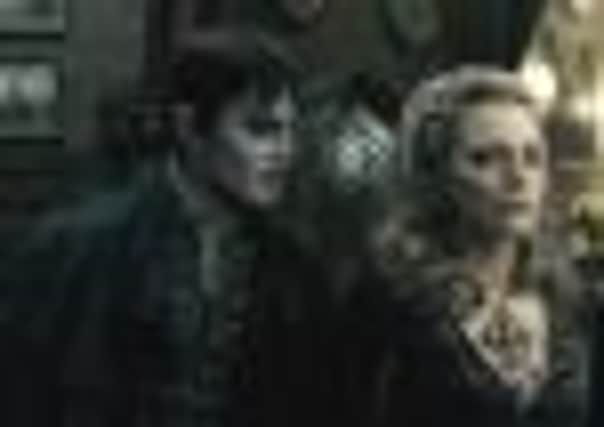Film review: Dark Shadows (12A)


Re-imagined – like the majority of Burton’s films since Planet of the Apes – from a previous screen incarnation (in this case, a largely forgotten Adams Family-esque American soap opera from the late 1960s), Dark Shadows is so messy it almost plays like a purer tribute to Burton’s beloved Ed Wood than Ed Wood.
Of course, it’s hard to believe for a second that this is an intentional artistic choice rather than an excuse for bungled high-concept filmmaking, but viewing it in this way does make it easier to appreciate what minor joys it has to offer.
Advertisement
Hide AdThere are flashes, for instance, of the Burton of old (the one who made Beetlejuice and the knowingly ramshackle big-budget Z-movie Mars Attacks!), especially in the first half of the film when Depp’s now (over)familiar brand of arch Hammer Horror-style acting gives his vampire protagonist, Barnabas Collins, an air of kitschy, kinky unpredictability. Newly exhumed in the year 1972 after two centuries of underground incarceration, Barnabas may be put through lots of groan-inducing, fish-out-of-water scenarios involving lampooning references to The Carpenters, hippies, McDonald’s and the existence of television, but Depp’s delivery of Barnabas’s anachronistic aristocratic dialogue does raise the odd smile. What’s more, this, combined with the fact that Barnabas kills innocent people, succumbs to the base desires of immortality seeking women, and engages in one elaborate, acrobatic, room-trashing bout of supernatural sex, suggests a subversive edge that has been sorely lacking much of Burton’s recent family friendly output.
But this is also part of the film’s problem. The 12A-rated Dark Shadows is, after all, still courting that family audience; indeed its tokenistic theme is the importance of family, something that is spelled out in a 1770s-set prologue in which Barnabas is cursed by Eva Green’s love-spurned witch Angelique and condemned to suffer for eternity as an alabaster-skinned blood-sucker.
Flash forward to 1972 and Barnabas’s sudden arrival coincides with a prolonged period of decline for the Collins family, now represented by a dysfunctional group comprising protective matriarch Elizabeth (Michelle Pfeiffer), her useless brother Roger (Jonny Lee Miller), his ghost-seeing motherless son David (Gulliver McGrath), and Elizabeth’s rebellious teen daughter Carolyn (Chloë Grace Moretz).
Resolving to restore the Collins family to its former glory, Barnabas sets about reinvigorating their fish-canning business – yes, really! – by hypnotising locals into switching allegiances from the town’s chief employer who, for reasons that left conveniently unexplained, just happens to be his scorned lover Angelique.
Muddled as this sounds, the plot is complicated further by the arrival of a new governess for the bereft and spectre-plagued David. This is Victoria (Bella Heathcote), a similarly haunted young woman who bears a striking resemblance to the love of Barnabas’s life, Josette, whose death two centuries earlier at the hands of Angelique is the real source of Barnabas’s torment. When he first sees Victoria, he thus becomes convinced he’s been given a second chance at love and the film manoeuvres them into place as fated soulmates. Unfortunately it then neglects to spend any time creating chemistry between Heathcote and Depp, expecting us to take it as read that they’re meant for each other because, well, that’s how stories of this sort function.
That’s symptomatic of the character development as a whole, though. Victoria, like the rest of the Collins clan – which also includes a live-in shrink (played by Helena Bonham Carter) who takes an unhealthy interest in Barnabas – are given short thrift by the film as Burton concentrates on Angelique’s unexplained obsession with trying to win Barnabas’s devotion.
Advertisement
Hide AdThat Burton should want to focus on the comic potential of this pair is perhaps understandable given that Green is a far more magnetic screen presence than the barely present Heathcote. But neither character makes much narrative sense and Burton and screenwriter Seth Grahame-Smith (author of best-selling horror mash-up novel Pride and Prejudice and Zombies) seem to be at such a loss as to what to do with the other characters or subplots that by the time the incident-packed final act rolls around they appear to just give up trying to make it cohere altogether. Plot twists come out of nowhere (one character is suddenly revealed to be a werewolf for no reason whatsoever); Alice Cooper makes an extended cameo appearance; hints are suddenly dropped about darker family secrets, and Barnabas’s murderous instincts are glossed over as proceedings begin to segue into Twilight territory. In the end, while Dark Shadows is fun for a while, there’s only so much that can be excused by Burton’s love of kitschy pop culture.
Dark Shadows (12A)
Directed by: Tim Burton
Starring: Johnny Depp, Eva Green, Michelle Pfeiffer, Chloe Grace Moretz, Johnny Lee Miller Rating: ***